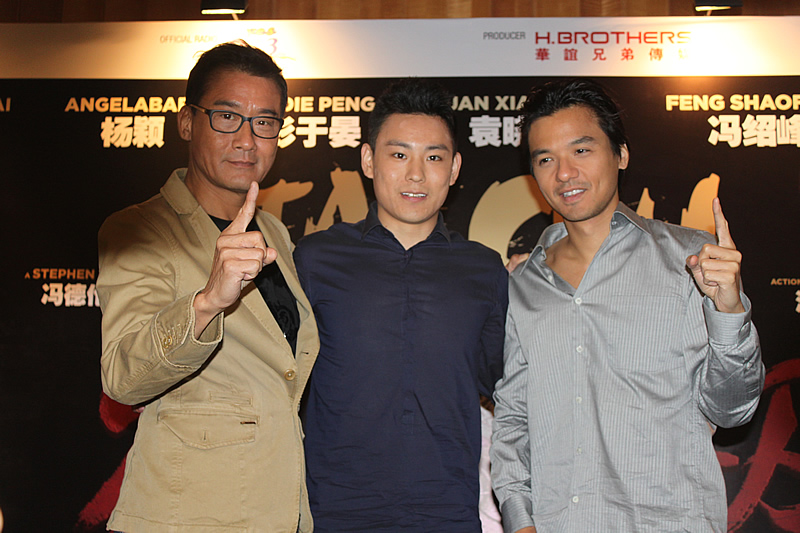INTERVIEW WITH DIRECTOR STEPHEN FUNG FOR TAI CHI ZERO
When producer Chen Kuo-Fu came to Stephen Fung with a movie about tai-chi, the latter was puzzled. ‘Why me?’ was the first thought in his head, he said. It was only after reading the treatment, that incidentally was also written by Kuo-Fu, that Stephen realised what his producer wanted to accomplish with ‘Tai Chi Zero’, the first of two films shot back-to-back in what is supposed to be a trilogy.
Right from the start, ‘Tai Chi Zero’ was never meant to be a conventional martial arts movie. Appearing in Singapore as part of a regional promotional tour for the movie, Stephen said that he was intrigued by some ‘steam-powered iron monster’ that Kuo-Fu had wrote would terrorise a remote village and which the protagonist, Yang Luchan, would have to conquer. And so, he set out to create what he hoped would be a breakthrough for the genre.
Indeed, ‘Tai Chi Zero’ has been hailed as just that, with Stephen eventually mixing some of his favourite elements of punk rock, steampunk, video game graphics and anime into the traditional narrative of an unlikely hero. And oh, let’s not forget about the formidable monster at the centre of the film, nicknamed ‘Troy’, designed by veteran production designer Tim Yip, whom Stephen readily lavishes praise on for his creativity and hard work.
For a movie that mixes so many new elements, Stephen relied on a team of veterans – among them Tim and action director Sammo Hung – to make sure that the movie cohered. It was important that he had a team he could trust, Stephen said, and he was glad to work with such a cooperative person as Sammo.
“He is a man of many ideas, so I would simply tell him the specific tone of a particular action sequence – for instance, a more comic feel for one set in the village square where the villagers start throwing fruits and vegetables at the invading Imperial army – as well as how the last scene connected to the first of the sequence, and Sammo would run ahead to do what he does best,” says Stephen.
Nonetheless, for the leading role of Yang Luchan, Stephen placed his hopes on a relative unknown – the 2010 Asian Games wushu gold medallist Yuan Xiaochao. The latter wasn’t an immediate fit for the character – despite being a martial arts practitioner, Luchan knew nothing about ‘tai chi’, and had to be subject to the same rigorous training regime as the rest of his fellow actors. But Stephen thought that he needed a fresh new face to complement his fresh new take to the genre.
“We wanted someone who could make audiences see this movie and the character from a completely new perspective,” says Stephen of the decision to cast Luchan. “This is why,” he adds, “though Jet Li was rumoured to be participating in this movie, we decided eventually not to cast him – but we might just bring him in for a supporting role in the final movie!”
Yes, there is one more to go, Stephen envisages, though that is pretty much still in infancy. “At some early point during production, we knew that we would not be able to squeeze the story we wanted to tell into one movie, so we went ahead to split the material we had into two movies instead and shoot them back-to-back to reduce costs.” Still it wasn’t a cheap shoot, and the RMB$300 mil project took six months to film.
Despite the pressures you might think the relatively new Stephen Fung might be facing, he says that he was unfazed with the challenge of attempting his first big-budget blockbuster. That was also echoed by his other lead star Tony Leung Kar-Fai, who attested that there was never a day when he saw Stephen lose his temper on the set – though Tony jokes that he might have taken his frustration out at the numerous flies around the set.
Rather, the 38-year-old Gen-X-er, who counts fellow actors Nicholas Tse and Daniel Wu among his peers, says that he has always been drawn to directing. He puts it down to his personality, which he acknowledges tends to like to be in control. An added benefit? It allows him to shy away from the media spotlight, which would undoubtedly be more glaring were he an actor.
With ‘Tai Chi Zero’, Stephen is even more convinced of his calling as a director. The film is also the first from his company Diversion Pictures, a joint venture with Daniel Wu, which has already three movies in production. Of the company’s name, he says that it reflects his and Daniel’s wish to redefine modern Chinese cinema.
Already, they have succeeded with ‘Tai Chi Zero’ – the movie premiered in Venice and Toronto earlier this year and has been picked up for distribution in the United States. But perhaps the most significant mark of recognition comes from Tony himself – the veteran says that it was the opportunity of working on something as groundbreaking as this that he decided to take up Stephen’s offer to star in the movie.
Tony even goes so far to hail Stephen as one of the brightest hopes for the industry in future, and we join him in optimism that this new ‘Fung’ (which means ‘wind’ in Chinese) is a harbinger of the exciting new possibilities ahead.
TAI CHI ZERO opens in theaters 4 October 2012 and is reviewed here
Our Interview with Tony Leung and Yuan Xiaochao

